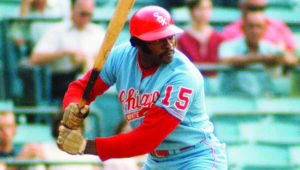By David Mullen
With the Dallas Cowboys in total freefall, the Mavericks and Stars seasons off to promising starts and the Texas Rangers adjusting their 2025 roster one year removed from a World Series championship, there was one story out of Dallas that was under the radar.

Photo courtesy of MLB
The Major League Baseball Winter Meetings just concluded at the Hilton Anatole. In the wake of the stunning news that 25-year-old outfielder Juan Soto signed a record-setting, 15-year, $765 million contract with the New York Mets, MLB announced that two legends from the Classic Era were voted into the National Baseball Hall of Fame.
On December 8, sluggers Dick Allen and Dave Parker earned election to the Hall, chosen among eight finalists, which included third baseman Ken Boyer, Negro League star pitcher John Donaldson, pitchers Tommy John and Luis Tiant and Los Angeles Dodgers and San Diego Padres first baseman Steve Garvey.
Allen and Parker had been previously overlooked by the Baseball Writers’ Association of America (BBWAA) for entrance into the Hall of Fame. Allen was considered abrasive and was not well liked by the media. Parker was involved in the 1985 Pittsburgh drug trials, when cocaine use was front and center in the sports world, particularly in baseball. Distain by the press and allegations of drug use kept Allen and Parker out of the Hall by the BBWAA voting, and that is a shame.
Both Allen and Parker were superstars in their era. When they came to bat, the ballpark came to attention. Both players won the Most Valuable Player Award. Both had impressive career stats.
But, when it comes to position players, I also use a totally unscientific method to weigh the viability of a player’s eligibility for entrance into the Hall. Ask the pitchers of the era who they didn’t want to face in their prime, and Allen and Parker would have been on a very short list.
The “Wampum [Pa.] Whopper,” Allen played 15 years — from 1963 to 1977 — primarily with the Philadelphia Phillies, where he was the 1963 NL Rookie of the Year. He won the AL MVP in 1972 as a member of the Chicago White Sox. He was a seven-time All-Star, finishing with a .292 lifetime batting average and 351 home runs. But, most importantly, Allen carried a big stick. Allen swung a 42-ounce bat, which is a telephone pole by today’s standards. His muscular body was a marvel, long before PEDs enhanced physiques. He didn’t step into the batter’s box; he engulfed it and dared pitchers to get him out.
Allen is credited with one of baseball’s classic one liners. When asked about his opinion of playing on artificial turf, which became commonplace in 1970’s ballparks, Allen said, “If a horse can’t eat it, I don’t want to play on it.”
After first playing in the shadow of Hall of Famer Willie Stargell in Pittsburgh, outfielder Parker came into his own. Nicknamed “The Cobra,” Parker had 215 hits and hit .338 in 1977 for the Pirates. In 1978, Parker hit .334 with 30 HRs, 117 RBI and won the NL MVP Award. He won two batting titles, three NL Gold Glove Awards and three NL Silver Slugger Awards.
In his 19-year career from 1973 to 1991, primarily with Pittsburgh and Cincinnati (where he grew up worshiping Frank Robinson), Parker hit .290 with 339 home runs and 1,493 RBIs. Parker played in the World Series in 1979 with Pittsburgh and in 1988 and 1989 with Oakland.
As intimidating as the left-handed hitting Parker was at bat, his defensive skills were legendary. He had the arm of a cannon. His performance in the 1979 All Star Game, throwing out Jim Rice and Brian Downing on the bases with laser accuracy, led to the game’s MVP trophy and a permanent place on All Star Game highlight reels.
Parker was a key player on the 1979 “We are Family” Pirates team who beat the Baltimore Orioles in seven games for the World Series championship. Parker was also quotable.
About the late season pennant races that Parker was a part of with Pittsburgh, Cincinnati and Oakland during his career, Parker said: “September is pantyhose month. No nonsense.” About his annual quest for the batting championship, Parker quipped, “When the leaves turn brown, I’ll be wearing the batting crown.”
The inevitable entry of two of baseball’s greatest sluggers into the hallowed grounds of Cooperstown is not without sadness. The delay that kept Allen out of the Hall of Fame until 2025 means he won’t be there to receive his plaque.
Allen died in his hometown Wampum in 2020. Parker, now frail at 73, was diagnosed with Parkinson’s disease in 2013 and has difficulty getting around without help.
Dick Allen and Dave Parker have finally earned their place in the Hall of Fame. It is a shame that it’s too late for them to appreciate their achievement. Those of us that watched them will never forget.
